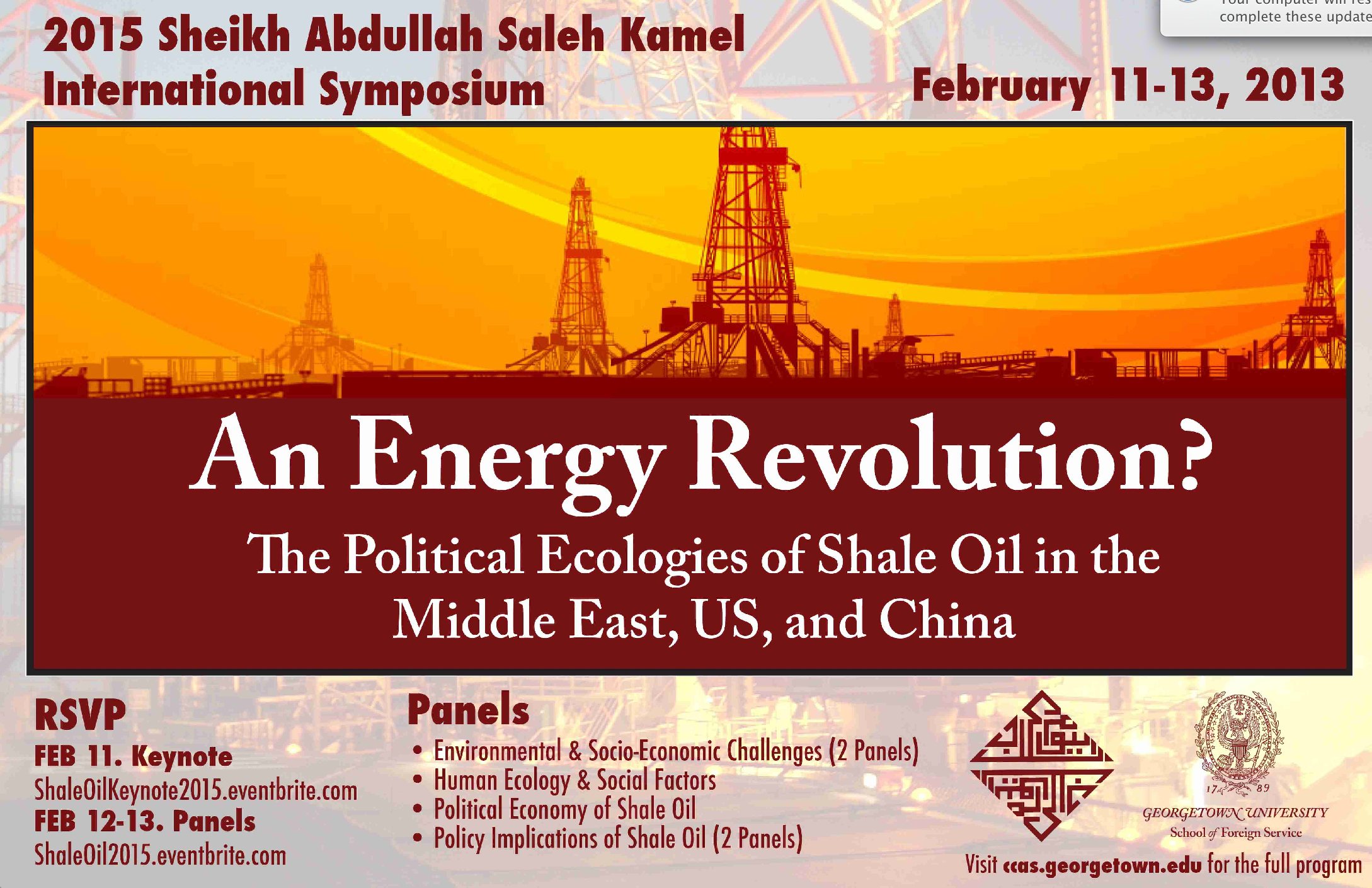Center for Contemporary Arab Studies
Edmund A. Walsh School of Foreign Service
Abdullah S. Kamel International Symposium
An Energy Revolution? Political Ecologies of Shale Oil in the Middle East, United States, and China
11-13 February
Georgetown University
Washington DC
The CCAS has been holding annual symposia for nearly three decades, and this year’s meeting aims to assess the political, economic, human, and environmental impacts of shale oil and its technologies of extraction globally, and particularly on the societies and economies of the MENA region.
Delivering our keynote is Dr. Peter H. Gleick, co-founder and president of the Pacific Institute for Studies in Development, Environment, and Security in Oakland, California. His research and writing address the critical connections between water and human health, the hydrologic impacts of climate change, sustainable water use, privatization and globalization, and international conflicts over water resources.
Please RSVP
For additional information regarding the conference and a complete program, see below or visit our website.
Day 1: February 11, 2015
Intercultural Center (ICC), Bunn Auditorium
6:00pm: Welcoming Remarks
- Osama Abi-Mershed, Director
Center for Contemporary Arab Studies, Georgetown University
6:15pm: Keynote Address: When Oil and Water Mix: The Future of the Water-Energy Nexus
- Dr. Peter Gleick, President and Co-founder
Pacific Institute
7:30pm: Reception (ICC Galleria, 3d Floor)
Day 2: February 12, 2015
Hariri Building, Lohrfink Auditorium
8:30-9:00am: Registration and Breakfast
9:00-9:15am: Welcome Address
- James Reardon-Anderson, Dean
School of Foreign Service
9:15-11:15am: Panel 1 -- Environmental & Socio-Eocnomic Challenges I
- Jeremy Boak, Project Manager, Colorado School of Mines
- Tim Beach, Professor, Georgetown University
- Ziad Mimi, Professor, Birzeit University
- Kate DeAngelis, Climate and Energy Campaigner, Friends of the Earth U.S.
11:30-1:00pm Panel 2 -- Environmental & Socio-Eocnomic Challenges II
- Hussein Amery, Associate Director, Colorado School of Mines
- Mark Giordano, Director, Georgetown University
- Marwa Daoudy, Professor, Georgetown University
1:00-3:00pm: Lunch (Center for Contemporary Arab Studies, ICC141)
3:00-4:30pm: Panel 3 -- Human Ecology and Social Factors
- Francesca de Châtel, Independent
- Karen Rignall, Professor, University of Kentucky
- Zahra Babar, Associate Director, Georgetown University - Qatar
Day 3: February 13, 2015
Hariri Building, Lohrfink Auditorium
9:00-9:30am: Registration and Breakfast
9:30-11:00am: Panel 4 -- Political Economy of Shale Oil
- David Painter, Professor, Georgetown University
- George Shambaugh, Associate Professor, Georgetown University
- Mohamed Aly Ramady, Professor, King Fahd University of Petroleum & Minerals
11:15-12:45pm: Panel 5 -- Policy Implications I
- Casimir Yost, Professor, Georgetown University
- Thomas McNaugher, Professor, Georgetown University
- Eckart Woertz, Senior Research Fellow, Barcelona Centre for International Affairs
12:45-2:45pm: Lunch (Center for Contemporary Arab Studies, ICC141)
3:00-4:30pm: Panel 6 -- Policy Implications II
- Fawzi Aloulou, Energy Information Administration
- Tareq Baconi, Research Scholar*, Columbia University
4:30-5:00pm: Closing
